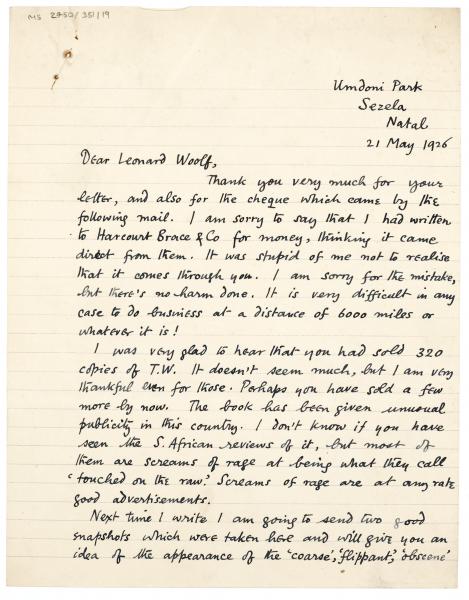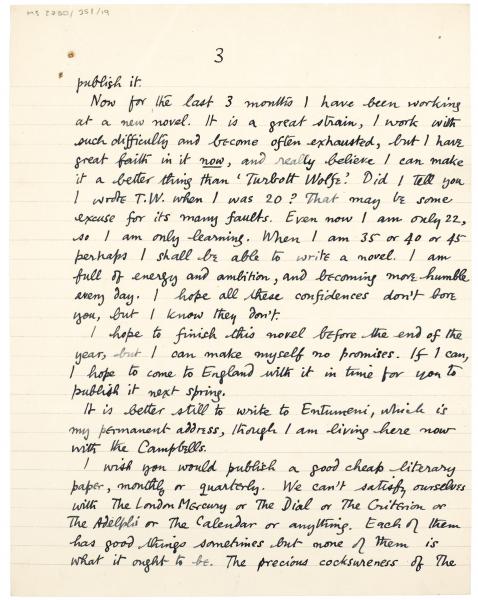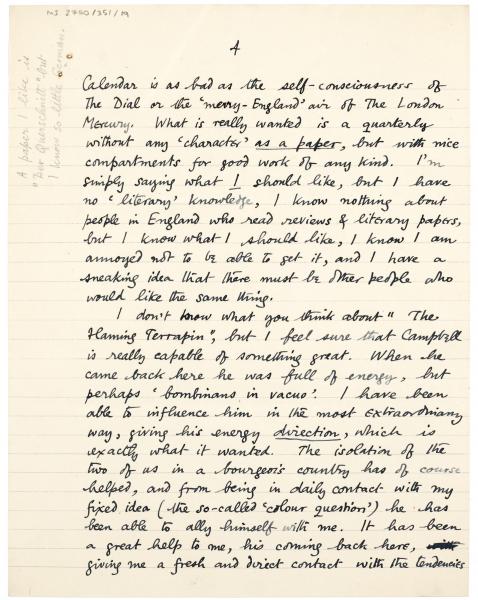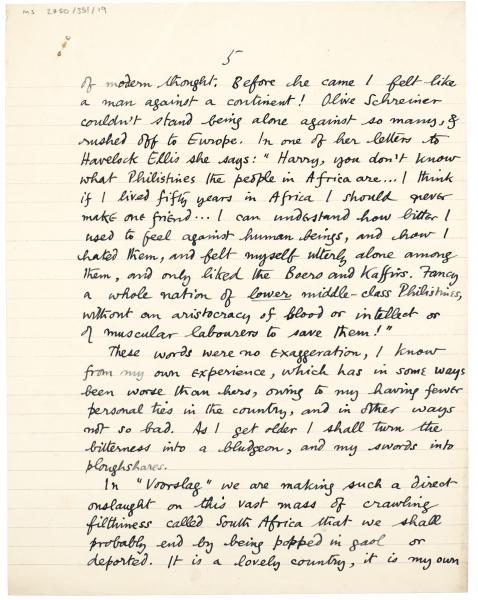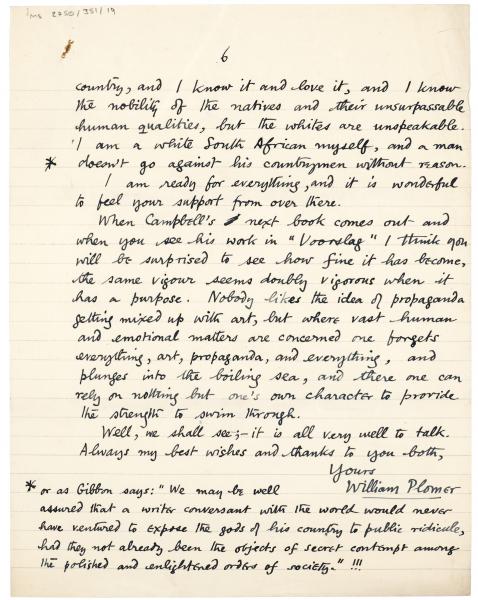[[1]]
[[MS 2750/351/19]]
Umdoni Park
Sezela
Natal
21 May 1926
Dear Leonard Woolf,
Thank you very much for your letter, and also for the cheque which came by the following mail. I am so sorry to say that I had written to Harcourt Brace & Co for money, thinking it came direct from them. It was stupid of me not to realise that it comes through you. I am sorry for the mistake, but there’s no harm done. It is very difficult in any case to do business at a distance of 6000 miles or whatever it is!
I was very glad to hear that you had sold 320 copies of T.W. [Turbott Wolfe] It doesn’t seem much, but I am very thankful even for those. Perhaps you have sold a few more by now. The book has been given unusual publicity in this country. I don’t know if you have seen the S[outh]. African reviews of it, but most of them are screams of rage at being what they call ‘touched on the raw’. Screams of rage are at any rate good advertisements.
Next time I write I am going to send two good snapshots which were taken here and will give you an idea of the appearance of the ‘coarse’, ‘flippant’, ‘obscene’
[[2]]
2
and ‘too clever’ ‘young man’ who wrote “Turbott Wolfe”!
It is very kind of you to offer to try and sell short stories for me in England, and I am more than thankful. The trouble is, that I have written a number of short stories, but never one yet that I was sufficiently, satisfied with to print. The only exception is this long short story that I told you about, “Portraits In The Nude” which is coming out in “Voorslag”. I hope to send you copies of the first three numbered. The first number ought to be out within in the next 3 weeks. If you like this story and can do anything with it I should be very glad, but it seems to me too long to be printed in any English paper, and too short to appear separately as a book. I believe if you published a book with about 5 stories of this length in it, all by different people, a sort of group, it would be quite an original and needful thing. I am not so impudent as to try and touch you your own business, but you will forgive me for suggesting the idea. This story of mine is an awkward size and I only thought that would be a good way of publishing it. If you It is quite possible that you may not like it. It took me a year to write it, and I polished it so much that it may be nothing but polish now and covered with fingerprints. I don’t think so, otherwise I wouldn’t
[[3]]
3
publish it.
now for the last 3 months I have been working at a new novel. It is a great strain, I work with such difficulty and become often exhausted, but I have great faith in it now, and really believe I can make it a better thing than ‘Turbott Wolfe’. Did I ever tell you I wrote T.W.[Turbott Wolfe] when I was 20? That may be some excuse for its many faults. Even now I am only 22, so I am only learning. When I am 35 or 40 or 45 perhaps I shall be able to write a novel. I am full of energy and ambition, and becoming more humble every day. I hope all these confidences don’t bore you, but I know they don’t.
I hope to finish this novel before the end of the year, but I can make myself no promises. If I can, I hope to come to England with it in time for you to publish it next spring.
It is better still to write to Entumeni, which is my permanent address, though I am living here now with the Campbells.
I wish you would publish a good cheap literary paper, monthly or quarterly. We can’t satisfy ourselves with The London Mercury or The Dial or The Criterion or The Adelphi or The Calendar or anything. Each of them has good things sometimes but none of them is when it ought to be. The precious cocksureness of The
[[4]]
4
[*A paper I like is "Der Querschnitt" but I know so little German*]
Calendar is as bad as the self-consciousness of The Dial on the ‘merry-England’ air of The London Mercury. What is really wanted is a quarterly without any ‘character’ as a paper, but with nice compartments for good work of any kind. I’m simply saying what I should like, but I have no ‘literary’ knowledge, I know nothing about people in England who read reviews & literary papers, but I know what I should like, I know I am annoyed not to be able to get it, and I have a sneaking idea that there must be other people who would like the same thing.
I don’t know what you think about the “The Flaming Terrapin”, but I feel sure that Campbell is really capable of something great. When he came back here he was full of energy, but perhaps ‘bombinans in vacuo’ I have been able to influence him in the most extraordinary way, but giving his energy direction, which is exactly what it wanted. The isolation of the two of us in a bourgeois country has of course helped, and from being in daily contact with my fixed idea (the so-called ‘colour question’) he has been able to ally himself with me. It has been a great help to me, his coming back here, with giving me a fresh and direct contact with the tendencies
[[5]]
5
of modern though. Before he came I felt like a man against a continent! Olive Schreiner couldn’t stand being alone against so many, & rushed off to Europe. In one of her letters to Havelock Ellis she says “Harry, you don’t know what Philistines the people in Africa are… I think if I lived fifty years in Africa I could never make one friend… I can understand how bitter I need to feel against human beings, and how I hated them, and felt myself utterly alone among them, and only liked the Boers and Kaffirs. Fancy a whole nation of lower middle-class Philistines, without an aristocracy of blood or intellect or of muscular labourers to save them!”
These words were no exaggeration, I know from my own experience, which has in some ways been worse than hers, owing to my having fewer personal ties in the country, and in other ways not so bad. As I get older I shall turn the bitterness into a bludgeon, and my swords into ploughshares.
In “Voorslag” we are making such a direct onslaught on this vast mass of crawling filthiness called South Africa that we shall probably end by being popped in gaol or deported. It is a lovely country, it is my own
[[6]]
6
country, and I know it and love it, I know the nobility of the natives and their unsurpassable human qualities, but the whites are unspeakable. I am a white South African myself, and a man * doesn’t go against his countrymen without reason.
I am ready for everything and it is wonderful to feel your support from over there.
When Campbell’s next book comes out and when you see his work in “Voorslag” I think you will be surprised to see how fine it has become, the same vigour seems doubly vigorous when it has a purpose. Nobody likes the idea of propaganda getting mixed up with art, but where vast human and emotional matters are concerned one forgets everything, art, propaganda, and everything, and plunges into the boiling sea, and there one can rely on nothing but one’s own character to provide the strength to swim through.
Well, we shall see; - it is very well to talk. Always my best wishes and thanks to you both,
Yours | William Plomer
* or as Gibbon says: “we may be well assured that a writer conversant with the world would never have ventured to expose the gods of his country to public ridicule, had they not already been the objects of secret contempt among the polished and enlightened orders of society.”!!!

